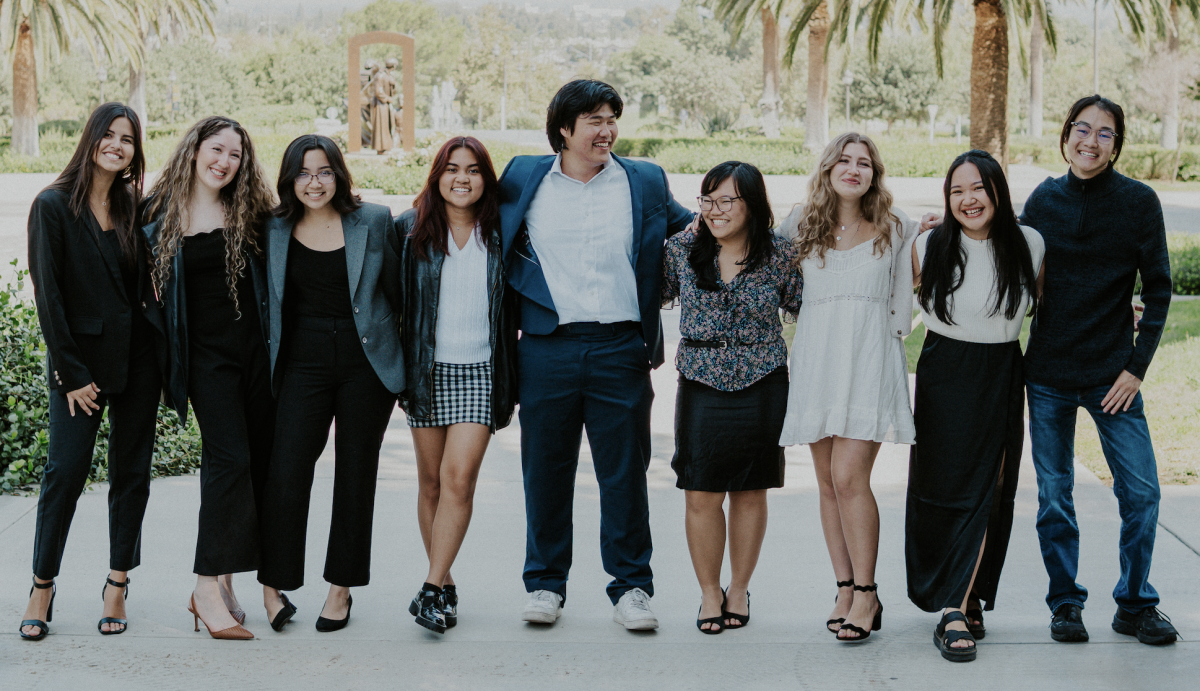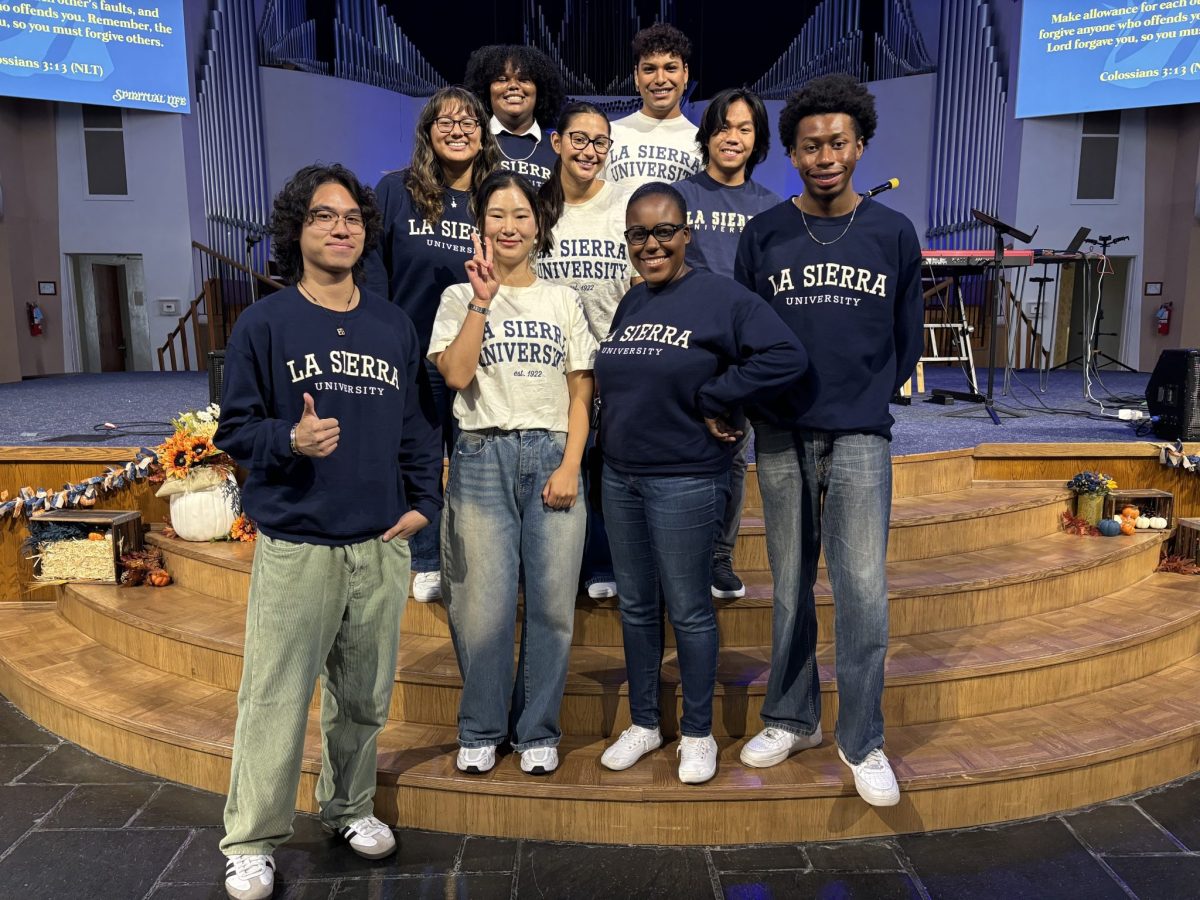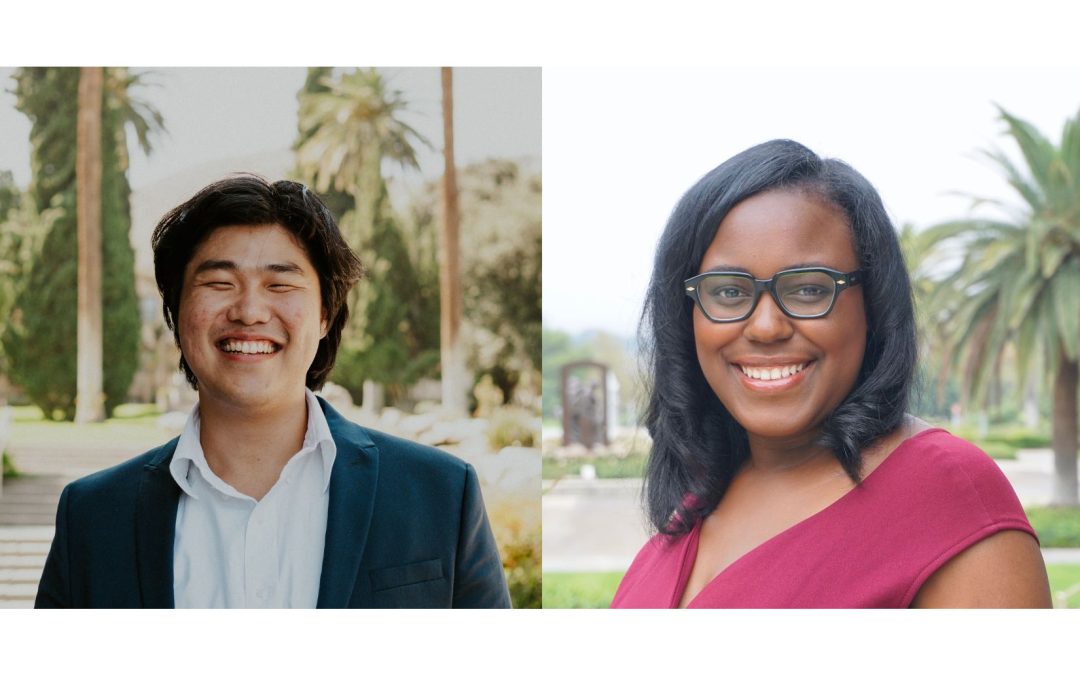I had the opportunity to speak with fourth-year biology/biomedical science major Caleb Kim and fourth-year history major Nyla Provost. Both Kim and Provost are part of the Honors class of 2025 and have been involved in the Student Association of La Sierra University (SALSU). Kim was president during the 2023-2024 academic year and Provost is currently president for the 2024-2025 academic year. They shared their inspirations and goals, as well as some advice for pursuing leadership and taking opportunities. Here’s how our interview went:
KJ: Caleb, would you introduce yourself briefly? Maybe include major, pre-professional, and anything else you want to add.
CK: I’m Caleb Kim, a fourth-year biology biomedical sciences with a minor in management. I love to play games, I love to work on my car, and I also love taking care of my three goldfish.
KJ: Thank you! Nyla, what about you?
NP: Sure, I am Nyla, as you know. I am studying history, sociology, and political science. I am a senior, so this is my last and final year — although who knows? I might come back for a master’s program. I’m in the process of applying to grad schools and looking at a lot of schools on the East Coast, like Harvard and Yale, all of those in the midst of being SALSU president.
KJ: Why did you decide to run for SALSU president when you did, and what inspirations did you have?
NP: As far as running goes, I never really ran for SALSU president. It kinda just landed in my hands. I wasn’t expecting to do it and I didn’t really want to do it, but the opportunity presented itself. Then I was like, “Oh man, this is something I actually could do.” At the beginning, there was a lot of self-doubt and being like, “There’s no way I could do that,” and “I’m not good enough to do that, I could never be Caleb,” but eventually, the time came around and Caleb had done a presentation at chapel. He wanted people to apply and so it was placed on my heart again and I thought maybe I should just reach out to Caleb and see what happens. I ended up actually texting Caleb. I think we actually had class together that afternoon-
CK: We did!
NP: Right, it was right before class I texted him “Hey Caleb, if I did run, be honest with me, what’s the scenario here? How many people are running, would it be a popularity contest? You’ve done this before, what would you say?” And Caleb gave me an open-ended answer. He said, “You should just run.” I said, “Okay, but what does that mean?” I ended up filling out the application and Caleb got back to me really quickly asking if I could come in for an interview. It was pretty quick from that point on. I ended up having a special election because I was uncontested, so I had to be voted by the Senate and a few other people. That’s sort of how it came to be. The beginning process was realizing I can do this and this was something I actually wanted to do. There’s an opportunity, I might as well take it.
CK: Yeah, before I say my talk, Nyla, I just wanted to say you’re doing a great job.
NP: Thank you, Caleb.
CK: Yeah, you’re not trying to fill in my footsteps, you’re just trying to keep your own! Anyway, I joined Senate my freshman year and it was kind of a little progression from there. After I saw what kind of changes I could create in our La Sierra community through Senate, I joined SALSU my sophomore year. I was the secretary/financial vice president. And in that position, I was able to get insight on what everyone did. I realized I could use this knowledge and experience as president to guide and push everyone else forward. So I ran for president junior year. I was also really inspired by Maya. She was the SALSU president the former year and she was a very strong leader. She was the one who kept pushing me on.

KJ: I have a question for you Caleb, Nyla said she texted you and you said to just run. Am I allowed to ask what strengths she had or what you thought about Nyla and why you wanted her to run?
CK: Yeah, so by this point I had already had class with Nyla several times. I know that Nyla is a very educated, thoughtful speaker so I was like, when it comes to Board of Trustees meetings and other important committees where we decide “Oh, do we want this class to be part of this curriculum,” I felt like Nyla would be able to say “Hmm, let’s think about it” and give a thoughtful response. Frankly, I feel like that was a strength I lacked, but someone like Nyla would do really well in that sense. On top of that, Nyla is a really funny person and easy to get along with.
NP: Aw, Caleb.
KJ: I also have a follow-up question for both of you based on your backgrounds. Caleb, you were talking a little bit about your experiences in SALSU and senate and how that helped make you more confident and interested in running, and I’m assuming it did help when you were president. Nyla, for you, I know that you’ve taken a lot of classes related to your HPS (history, political science, and sociology) major, which might make sense for student government. So how would you both say your background has assisted you in your president role?
CK: I feel like it was more my experiences rather than my educational background that fueled me down this path. In high school, I did three years in class offices, two of those being as president. If you go way further back, I was a VBS leader and worked at my dad’s restaurant since fifth grade. So my skills of team management, leadership, all of that started from there. I guess the educational portion didn’t stem from the science classes but rather the Honors classes, where I learned about how communities work and how to create unity within a community.
NP: I would say for me, yes my education does add to my experience and qualifications for the job and just how I go about my particular administration and the type of president I want to be. In history, my specialization is actually presidential history, and so I’ve studied these different presidential administrations and their leadership skills and the reasons why their administrations didn’t work, you know, what works and what doesn’t work — everything that goes into holding that kind of office. As someone who dissects these things, it’s very easy to go back and say “I know where I got that from,” it’s because I’ve been reading about it so much that it eventually became something that I picked up. As far as experience goes, I have been in leadership positions for a very long time. I started out as a church board member at the age of fifteen. In high school, I did some volunteering for some political campaigns. When I came to La Sierra, I became the head secretary at the humanities department. I oversaw various projects and operations. In between that time, at La Sierra, I was president of the Pre-law society and president of the book club. So I had various occasions where I had dabbled in leadership. I had gotten a couple certifications from different university programs and certificates in leadership. When the time came for the opportunity to be SALSU president, now looking back, I’m like, “Oh my goodness, why did you think that you couldn’t do it? You had all this experience and all these qualifications for it. I just didn’t see it and I just didn’t believe it.
KJ: That’s super interesting! Thank you! Going back to what it’s like going into your presidency, what goals did you both have? What was your vision? And what challenges did you predict?
NP: Starting out, I knew that I wanted to be an active president. I wanted to do as much as I could in the short amount of time I had. I didn’t want to miss the moment because I knew the gravity of the moment. Being in this current situation that our school finds itself in where we have this new university president, we’ve hired a bunch of people who are extremely excited about making change and making La Sierra a better place so that it can continue to be a good school for the students in our reach. So you have all these moving parts, and I felt like with all this in mind, we as the student government, we could really have an opportunity for those thoughts that we had to be heard by the voices in charge. I was like, okay, we need to have a plan and we need to be aggressive within reach and within reason. I came up with the slogan for my presidency to be “daring in application but bold within reason.” So there’s a lot of things I’d like to do and a lot of conversations I would like to have but still be reasonable about them and know that yes, we can do a lot during our time and we can do a lot of good things for our campus, but it’s going to take hard work. It’s going to take dedication and not everything we want to do will get done but we will get a good amount of it done.
CK: I think my primary goal stepping into my position was number 1) reviving the activities on campus. I feel like that’s something we lacked in the last couple years and so I tried to bring more attention to the athletics department, tried to create more on-campus events that SALSU hosted. I will say most of my time actually got directed towards keeping our student body united. Because we had an interim president, a lot of people didn’t know who our president was. When the presidential search committee became a thing, I was responsible for advocating for every single student on campus. I think we did a great job. The candidate that did get selected at the end was by far the most supported by the student body.
KJ: Yeah, I think it’s interesting because you both came in at unique times in our campus history. Caleb came in at the interim time and Nyla you’re coming in with the new president. I’m glad we had you in these positions of leadership at these times. Caleb, I wanted to ask what you learned about leadership during your time as president. And do you have any advice for Nyla?
CK: I think the biggest thing I learned was how big of an impact my actions and my words have on others. Not only am I a leader of a team of ten people but I’m also representing every student on campus. So every single word I say on campus, even if it’s outside of the SALSU context, can bring consequences if it’s not said in the right context. So that’s one piece of advice I have for Nyla, to be careful what you say in public haha. The second thing I would say is that you really gotta learn how to resolve conflict. Problems are going to arise in your team, I promise you. But when those moments come, you just have to be the interceder, don’t take any sides, hear everyone out, and if need be, then you decide the next steps from there. Develop that good sense of judgment, and I believe that you already have it.
KJ: Following that, Nyla, do you have any particular questions for Caleb?
NP: I don’t at the moment. We had a lot of time to talk, me and Caleb, that last quarter. I actually bombarded Caleb with maybe too many questions. For the most part, I don’t have anything right now but I do know if I did, Caleb would respond and answer and give me honesty. That’s quite important, a leader being transparent. I really appreciate that about Caleb. When we were going through the transition, he told me the good things about the job but he was also very transparent about everything that comes with it that isn’t necessarily good.
KJ: Aw that’s great! Okay, Caleb, I just wanted to finish off with a question: were there any highlights to your term, maybe things that Nyla can look forward to even if it might be different for her?
CK: I think I really enjoyed our SALSU dinners together. This is basically when the SALSU team would go out and have a meal together. I really enjoyed those because I got to learn more about what my teammates were like, where they came from. I also really enjoyed when the whole presidential search committee was happening, we all met in South Hall and I just loved like – this is democracy. This is people listening to the candidates and saying what they like about this person. I really enjoyed that and I hope that you can experience some kind of setting like that Nyla.
NP: Yeah, yeah, I remember that and agreed.
KJ: Well that’s all I had but it’s an open floor for more conversation if anyone wants to jump in.
CK: Aside from the interview, Nyla, how is SALSU going this year?
NP: It’s going great! I’m actually really proud of our team. We clicked really well at the beginning and since then, we’ve been doing a lot. Each of my team members has been bringing things to the table that I never expected. They’ve been very progressive and aggressive with the things that they’re doing. So it’s been great. I’ve had the chance to go about doing the same thing, work on projects early in my administration, that were brought up based on ideas from students. I really appreciate how it’s been going. Thanks for asking.

CK: Have you been in close contact with President Arthur? I know that you were talking about meeting frequently and you even met in the summer.
NP: Yeah, Dr. Arthur’s been great. His openness to the student body has just been exceptional. It speaks volumes. I meet with him a couple of times every month, so he’s been great.
KJ: That’s great! I have a final question, do you have anything to say to the student body, Nyla?
NP: Yeah, sure! I am here to serve. I’ve been able to work on some projects thus far, I would like to continue working on more on behalf of students. So whatever concerns they have, anything they want to see happen bring it to me and we’ll see what we can do.
KJ: Thank you both so much!
—Katie Jang, Class of 2025: English literature/Pre-dentistry

